| Listing 1 - 10 of 13 | << page >> |
Sort by
|
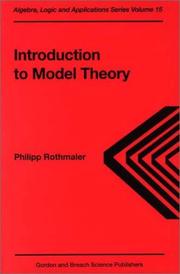
ISBN: 9056993135 9789056993139 Year: 2000 Publisher: New York Taylor & Francis
Abstract | Keywords | Export | Availability | Bookmark
 Loading...
Loading...Choose an application
- Reference Manager
- EndNote
- RefWorks (Direct export to RefWorks)
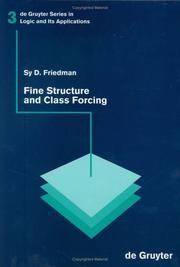
ISSN: 14381893 ISBN: 3110167778 3110809117 9783110809114 9783110167771 Year: 2000 Volume: 3 Publisher: Berlin New York Walter de Gruyter
Abstract | Keywords | Export | Availability | Bookmark
 Loading...
Loading...Choose an application
- Reference Manager
- EndNote
- RefWorks (Direct export to RefWorks)
Book
ISBN: 9780444533975 0444533974 9786613838544 0080957528 1283526093 Year: 2000 Publisher: Burlington : Elsevier Science,
Abstract | Keywords | Export | Availability | Bookmark
 Loading...
Loading...Choose an application
- Reference Manager
- EndNote
- RefWorks (Direct export to RefWorks)
Provability, Computability and Reflection
Algebra, Abstract --- Metamathematics --- Model theory --- Algèbre abstraite --- Métamathématique --- Théorie des modèles --- EPUB-LIV-FT ELSEVIER-B --- Algebra, Abstract. --- Logic, Symbolic and mathematical -- Periodicals. --- Logic, Symbolic and mathematical. --- Mathematics. --- Model theory.
Book
ISBN: 0720422566 9780444534187 0444534180 9786613838865 0080957730 1283526417 9780720422566 Year: 2000 Publisher: Burlington : Elsevier Science,
Abstract | Keywords | Export | Availability | Bookmark
 Loading...
Loading...Choose an application
- Reference Manager
- EndNote
- RefWorks (Direct export to RefWorks)
Provability, Computability and Reflection
Mathematical logic --- Model theory. --- Axiomatic set theory. --- Forcing (Model theory). --- Logic, Symbolic and mathematical --- Logique mathématique --- Model theory --- Théorie des modèles --- Forcing (Model theory) --- Forcing (mathématiques) --- Intuitionistic mathematics. --- Mathématiques intuitionnistes. --- Axiomatic set theory --- Théorie des modèles --- Théorie axiomatique des ensembles --- Forcing (Théorie des modèles) --- EPUB-LIV-FT ELSEVIER-B --- Logic, Symbolic and mathematical -- Periodicals. --- Logic, Symbolic and mathematical. --- 510.2 --- Axioms --- Set theory --- 510.2 Foundations of mathematics --- Foundations of mathematics
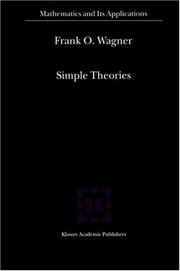
ISBN: 0792362217 9048154170 9401730024 9780792362210 Year: 2000 Volume: v. 503 Publisher: Dordrecht ; Boston : Kluwer Academic Publishers,
Abstract | Keywords | Export | Availability | Bookmark
 Loading...
Loading...Choose an application
- Reference Manager
- EndNote
- RefWorks (Direct export to RefWorks)
Simplicity theory is an extension of stability theory to a wider class of structures, containing, among others, the random graph, pseudo-finite fields, and fields with a generic automorphism. Following Kim's proof of `forking symmetry' which implies a good behaviour of model-theoretic independence, this area of model theory has been a field of intense study. It has necessitated the development of some important new tools, most notably the model-theoretic treatment of hyperimaginaries (classes modulo type-definable equivalence relations). It thus provides a general notion of independence (and of rank in the supersimple case) applicable to a wide class of algebraic structures. The basic theory of forking independence is developed, and its properties in a simple structure are analyzed. No prior knowledge of stability theory is assumed; in fact many stability-theoretic results follow either from more general propositions, or are developed in side remarks. Audience: This book is intended both as an introduction to simplicity theory accessible to graduate students with some knowledge of model theory, and as a reference work for research in the field.
Model theory. --- Théorie des modèles --- Model theory --- Théorie des modèles --- Mathematical logic. --- Group theory. --- Commutative algebra. --- Commutative rings. --- Mathematical Logic and Foundations. --- Group Theory and Generalizations. --- Commutative Rings and Algebras. --- Rings (Algebra) --- Algebra --- Groups, Theory of --- Substitutions (Mathematics) --- Algebra of logic --- Logic, Universal --- Mathematical logic --- Symbolic and mathematical logic --- Symbolic logic --- Mathematics --- Algebra, Abstract --- Metamathematics --- Set theory --- Syllogism
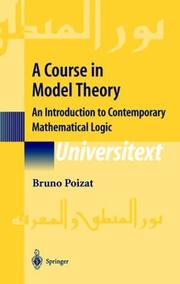
ISBN: 0387986553 9780387986555 1461264464 1441986227 Year: 2000 Publisher: New York (N.Y.): Springer
Abstract | Keywords | Export | Availability | Bookmark
 Loading...
Loading...Choose an application
- Reference Manager
- EndNote
- RefWorks (Direct export to RefWorks)
This book, translated from the French, is an introduction to first-order model theory. The first six chapters are very basic: starting from scratch, they quickly reach the essential, namely, the back-and-forth method and compactness, which are illustrated with examples taken from algebra. The next chapter introduces logic via the study of the models of arithmetic, and the following is a combinatorial tool-box preparing for the chapters on saturated and prime models. The last ten chapters form a rather complete but nevertheless accessible exposition of stability theory, which is the core of the subject.
Model theory --- Théorie des modèles --- Model theory. --- Théorie des modèles --- Logic, Symbolic and mathematical --- Mathematical logic. --- Mathematical Logic and Foundations. --- Algebra of logic --- Logic, Universal --- Mathematical logic --- Symbolic and mathematical logic --- Symbolic logic --- Mathematics --- Algebra, Abstract --- Metamathematics --- Set theory --- Syllogism
Book
ISBN: 8879993127 9788879993128 Year: 2000 Publisher: [Roma] Aracne
Abstract | Keywords | Export | Availability | Bookmark
 Loading...
Loading...Choose an application
- Reference Manager
- EndNote
- RefWorks (Direct export to RefWorks)
Model theory. --- Geometry, Algebraic. --- Geometry, Analytic. --- 512.7 --- Analytical geometry --- Geometry, Algebraic --- Algebra --- Conic sections --- Algebraic geometry --- Geometry --- 512.7 Algebraic geometry. Commutative rings and algebras --- Algebraic geometry. Commutative rings and algebras --- Logic, Symbolic and mathematical --- Graphic methods --- Model theory --- Geometry, Analytic --- Logique mathématique --- Théorie des modèles --- Geometrie
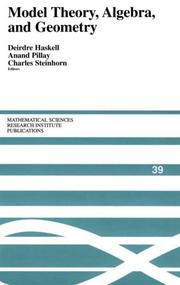
ISBN: 0521780683 9780521780681 Year: 2000 Volume: 39 Publisher: Cambridge New York Cambridge University Press
Abstract | Keywords | Export | Availability | Bookmark
 Loading...
Loading...Choose an application
- Reference Manager
- EndNote
- RefWorks (Direct export to RefWorks)
Model theory has, in recent years, made substantial contributions to semialgebraic, subanalytic, p-adic, rigid and diophantine geometry. This book provides the necessary background to understanding the theory and mathematics.
Model theory --- Geometry --- Algebraic fields. --- Algebraic fields --- Algebraic number fields --- Algebraic numbers --- Fields, Algebraic --- Algebra, Abstract --- Algebraic number theory --- Rings (Algebra) --- Mathematics --- Euclid's Elements --- Logic, Symbolic and mathematical
Book
ISBN: 9780444534217 0444534210 9786613838940 0080957765 1283526492 Year: 2000 Publisher: Burlington : Elsevier Science,
Abstract | Keywords | Export | Availability | Bookmark
 Loading...
Loading...Choose an application
- Reference Manager
- EndNote
- RefWorks (Direct export to RefWorks)
Provability, Computability and Reflection
Axiomatic set theory --- Model theory --- Constructibility (Set theory) --- Théorie axiomatique des ensembles --- Théorie des modèles --- Constructibilité (Théorie des ensembles) --- EPUB-LIV-FT ELSEVIER-B --- Axiomatic set theory. --- Constructibility (Set theory). --- Logic, Symbolic and mathematical -- Periodicals. --- Logic, Symbolic and mathematical. --- Model theory. --- Algebra of logic --- Logic, Universal --- Mathematical logic --- Symbolic and mathematical logic --- Symbolic logic --- Mathematics --- Algebra, Abstract --- Metamathematics --- Set theory --- Syllogism --- Logic, Symbolic and mathematical --- Constructible sets --- Sets, Constructible --- Axioms

ISSN: 03029743 ISBN: 3540676287 9783540676287 354045148X Year: 2000 Volume: 1817 Publisher: Berlin, Heidelberg : Springer Berlin Heidelberg : Imprint: Springer,
Abstract | Keywords | Export | Availability | Bookmark
 Loading...
Loading...Choose an application
- Reference Manager
- EndNote
- RefWorks (Direct export to RefWorks)
This volume contains the proceedings of the ninth international workshop on logic-based program synthesis and transformation (LOPSTR’99) which was held in Venice (Italy), September 22-24, 1999. LOPSTRistheannualworkshopandforumforresearchersinthelogic-based program development stream of computational logic. The main focus used to be on synthesis and transformation of logic programs, but the workshop is open to contributions on logic-based program development in any paradigm. Previous workshops were held in Manchester, UK (1991, 1992), Louvain-la-Neuve, B- gium (1993), Pisa, Italy (1994), Arnhem, The Netherlands (1995), Stockholm, Sweden (1996), Leuven, Belgium (1997), and Manchester, UK (1998). LOPSTR is a real workshop in the sense that it is a friendly and lively forum for presenting recent and current research as well as discussing future trends. Formal proceedings of the workshop are produced only after the workshop and contain only those papers selected by the program committee after a second refereeing process. The program committee of LOPSTR’99 accepted 20 extended abstracts for presentation at the workshop; then selected 14 papers for inclusion in the po- workshop proceedings. Selected papers cover all the main streams of LOPSTR’s topics: synthesis, specialization, transformation, analysis, and veri?cation. Ve- ?cation, transformation, and specialization methods are applied to functional, constraint, logic, and imperative programming.
681.3*D16 --- Logic programming --- 681.3*D11 --- 681.3*F31 --- 681.3*F41 --- 681.3*I22 --- 681.3*D11 Applicative (functional) programming --- Applicative (functional) programming --- 681.3*I22 Automatic programming: automatic analysis of algorithms program modification program synthesis program transformation program verification (Artificialintelligence)--See also {681.3*D12} {681.3*F31} --- Automatic programming: automatic analysis of algorithms program modification program synthesis program transformation program verification (Artificialintelligence)--See also {681.3*D12} {681.3*F31} --- 681.3*F41 Mathematical logic: computability theory computational logic lambda calculus logic programming mechanical theorem proving model theory proof theoryrecursive function theory--See also {681.3*F11} {681.3*I22} {681.3*I23} --- Mathematical logic: computability theory computational logic lambda calculus logic programming mechanical theorem proving model theory proof theoryrecursive function theory--See also {681.3*F11} {681.3*I22} {681.3*I23} --- 681.3*F31 Specifying anf verifying and reasoning about programs: assertions invariants mechanical verification pre- and post-conditions (Logics and meanings of programs)--See also {681.3*D21} {681.3*D24} {681.3*D31} {681.3*E1} --- Specifying anf verifying and reasoning about programs: assertions invariants mechanical verification pre- and post-conditions (Logics and meanings of programs)--See also {681.3*D21} {681.3*D24} {681.3*D31} {681.3*E1} --- Computerwetenschap--?*D16 --- Computer science. --- Software engineering. --- Computer programming. --- Computer logic. --- Mathematical logic. --- Artificial intelligence. --- Computer Science. --- Software Engineering/Programming and Operating Systems. --- Logics and Meanings of Programs. --- Programming Techniques. --- Artificial Intelligence (incl. Robotics). --- Mathematical Logic and Formal Languages. --- Algebra of logic --- Logic, Universal --- Mathematical logic --- Symbolic and mathematical logic --- Symbolic logic --- Mathematics --- Algebra, Abstract --- Metamathematics --- Set theory --- Syllogism --- Computer science logic --- Logic, Symbolic and mathematical --- Computers --- Electronic computer programming --- Electronic data processing --- Electronic digital computers --- Programming (Electronic computers) --- Coding theory --- Computer software engineering --- Engineering --- Informatics --- Science --- AI (Artificial intelligence) --- Artificial thinking --- Electronic brains --- Intellectronics --- Intelligence, Artificial --- Intelligent machines --- Machine intelligence --- Thinking, Artificial --- Bionics --- Cognitive science --- Digital computer simulation --- Logic machines --- Machine theory --- Self-organizing systems --- Simulation methods --- Fifth generation computers --- Neural computers --- Programming --- 681.3*I22 Automatic programming: automatic analysis of algorithms; program modification; program synthesis; program transformation; program verification (Artificialintelligence)--See also {681.3*D12}; {681.3*F31} --- Automatic programming: automatic analysis of algorithms; program modification; program synthesis; program transformation; program verification (Artificialintelligence)--See also {681.3*D12}; {681.3*F31} --- 681.3*F41 Mathematical logic: computability theory; computational logic; lambda calculus; logic programming; mechanical theorem proving; model theory; proof theory;recursive function theory--See also {681.3*F11}; {681.3*I22}; {681.3*I23} --- Mathematical logic: computability theory; computational logic; lambda calculus; logic programming; mechanical theorem proving; model theory; proof theory;recursive function theory--See also {681.3*F11}; {681.3*I22}; {681.3*I23} --- 681.3*F31 Specifying anf verifying and reasoning about programs: assertions; invariants; mechanical verification; pre- and post-conditions (Logics and meanings of programs)--See also {681.3*D21}; {681.3*D24}; {681.3*D31}; {681.3*E1} --- Specifying anf verifying and reasoning about programs: assertions; invariants; mechanical verification; pre- and post-conditions (Logics and meanings of programs)--See also {681.3*D21}; {681.3*D24}; {681.3*D31}; {681.3*E1} --- Logic design. --- Artificial Intelligence. --- Design, Logic --- Design of logic systems --- Digital electronics --- Electronic circuit design --- Logic circuits --- Switching theory --- Logic programming - Congresses
| Listing 1 - 10 of 13 | << page >> |
Sort by
|

 Search
Search Feedback
Feedback About
About Help
Help News
News